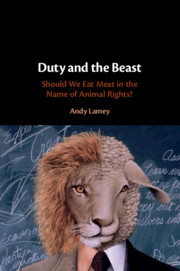Book contents
- Duty and the Beast
- Duty and the Beast
- Copyright page
- Contents
- Acknowledgments
- Introduction: The New Animal Debate
- Chapter 1 The Case for Animal Protection
- Chapter 2 A View to a Kill
- Chapter 3 Burger Veganism
- Chapter 4 The Dinner of Double Effect
- Chapter 5 Killing Them Softly
- Chapter 6 What Is It Like to Be a Chicken?
- Chapter 7 The Logic of the Larder
- Chapter 8 Thinking Like a Plant
- Chapter 9 Long Live the New Flesh
- Bibliography
- Index
Chapter 1 - The Case for Animal Protection
Published online by Cambridge University Press: 25 March 2019
- Duty and the Beast
- Duty and the Beast
- Copyright page
- Contents
- Acknowledgments
- Introduction: The New Animal Debate
- Chapter 1 The Case for Animal Protection
- Chapter 2 A View to a Kill
- Chapter 3 Burger Veganism
- Chapter 4 The Dinner of Double Effect
- Chapter 5 Killing Them Softly
- Chapter 6 What Is It Like to Be a Chicken?
- Chapter 7 The Logic of the Larder
- Chapter 8 Thinking Like a Plant
- Chapter 9 Long Live the New Flesh
- Bibliography
- Index
Summary
The philosophy of animal protection traditionally takes for granted our least controversial moral views, such as the idea that other human beings can make genuine moral claims on us. It then seeks to enhance them with further principles of its own. In this way it is like an application for a phone or computer, which achieves functionality by being added to an existing operating system. My primary concern is with the operating system, not the application. I seek to outline two principles that have been common to most versions of animal protection: anti-speciesism and moral individualism. While not every argument for protectionism endorses both claims, the great majority do, and so outlining these two principles are the best place to begin. (Insofar as a critique of protection rejects either of these notions it will be a rejectionist critique rather than a separatist one.) Both principles achieve their force by presupposing certain moral claims that are not unique to protectionism. The most relevant of these are the bedrock claim that causing human suffering requires justification, and that moral judgment commonly (but not universally) involves extending equal consideration to the interests of individuals affected by our decisions.
- Type
- Chapter
- Information
- Duty and the BeastShould We Eat Meat in the Name of Animal Rights?, pp. 17 - 37Publisher: Cambridge University PressPrint publication year: 2019

